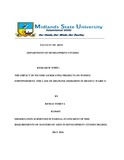Please use this identifier to cite or link to this item:
https://cris.library.msu.ac.zw//handle/11408/2645| Title: | The impact of income generating projects on women empowerment. the case of Helpline Zimbabwe in Shamva Ward 11 | Authors: | Toreva, Renias | Keywords: | Income generating projects Shamva Helpline Zimbabwe Womwen in income generating projects |
Issue Date: | 2016 | Publisher: | Midlands State University | Abstract: | The purpose of the study was to assess the impact of income generating projects on women’s empowerment. A case of income generating projects funded by Helpline Zimbabwe in Shamva Ward 11 was used as the study area. Data collection methods included participatory observations, focus group discussions and interviews with 30 women who benefited from Helpline Zimbabwe’s income generating projects since 2010. Key informant interviews were conducted with strategic stakeholders who were actively involved in the implementation and monitoring of income generating projects funded by Helpline Zimbabwe. The study found out that income generating projects play a critical role in uplifting the status of rural women by improving their access and control of own income, ownership of assets and improving household food security. It was also noted that women who benefited in the income generating projects were in a better position to pay for the education of their children, access better health facilities and were active in decision making at both household and community levels. The Most Significant Change (MSC) approach was used to enable project participants share their life experiences before and after the projects. Some of the benefits obtained by the women after their involvement in income generating projects included freedom of movement, improved self-worth and reduced exposure to domestic violence. The study highlighted main obstacles and challenges that may threaten the empowerment of women in Shamva using IGPs. It was discovered that limited access to bank loans, religious and cultural practice ,low educational status of women, poor government support, unavailability of sporting infrastructure, stiff competition and low demand of their products are some of the obstacles that are militating against their income generating initiatives. The study also found out that local non-governmental organizations such as Helpline Zimbabwe face a number of challenges which include inadequate funding, high staff turnover, and poor engagement of strategic stakeholders as well as political interference. The participants of this study recommended that it is crucial for NGOs to work together with government ministries to promote sustainability of IGPs. The study also found that women empowerment programmes should include men in order to address the social and cultural practices that militate against empowerment of women. | URI: | http://hdl.handle.net/11408/2645 |
| Appears in Collections: | Master Of Arts In Development Studies |
Files in This Item:
| File | Description | Size | Format | |
|---|---|---|---|---|
| FINAL DISSERTATION MADS RENIAS TOREVA 2.pdf | Full text | 1.41 MB | Adobe PDF |  View/Open |
Page view(s)
146
checked on Jan 1, 2026
Download(s)
166
checked on Jan 1, 2026
Google ScholarTM
Check
Items in MSUIR are protected by copyright, with all rights reserved, unless otherwise indicated.



